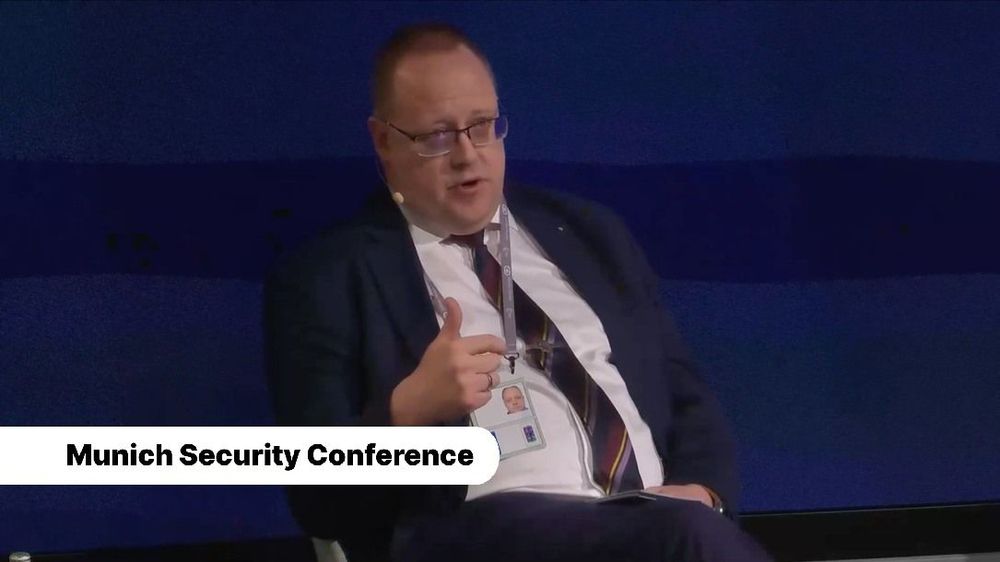Estonian spy chief: ‘Hybrid schmybrid, what’s happening is attacks’
MUNICH, Germany — The head of the Estonian Foreign Intelligence Service has criticized the “misleading and soft” word “hybrid” being used to describe Russian acts of sabotage and subversion across the continent.
In a late panel discussion on Saturday at the Munich Security Conference, Kaupo Rosin protested the use of the word which has been applied to a range of hostile activities that are deemed to be deniable or below the threshold justifying an armed response.
“Hybrid schmybrid,” he said. “I think the word ‘hybrid’ is misleading and soft… What’s happening is attacks, cyberattacks, assassination plots, maybe in some parts it’s actually state-sponsored terrorism what is going on.”
Estonia, which was occupied by Russia during WWII — with tens of thousands of Estonian families deported to Russia, including the mother of former Prime Minister Kaja Kallas, now the European Union’s foreign policy chief — has been a vocal supporter of Ukraine as it resists Russia’s full-blown invasion.
The country, which has a population of only 1.4 million — approximately one-fifth of whom are considered ethnic Russians — has, similarly to Ukraine, been historically forced to defend against Moscow’s interference, although as a NATO member since 2004 it has not faced a military invasion.
Estonia’s government has provided Ukraine with around €500 million ($524 million) in military assistance, equivalent to more than 1.4% of the country’s GDP. During the course of that support, the country has arrested a number of people for conducting sabotage and vandalism on behalf of Russia’s intelligence services.
Similar “hybrid” incidents have been occurring across Europe. Last year, Germany identified Russian cyber espionage targeting political parties, alongside the interception and leaking of a conversation between military officials about support for Ukraine.
Rosin acknowledged there was a wide variety of approaches across Europe in terms of the powers available and the legal mandate for security and intelligence agencies to tackle these threats.
“I feel that in [the] Estonian case, our foreign intelligence… and our internal security service have a proper mandate to go after those guys, to catch them. So all the tools which are out there, we are able to use. I know in different European counties, it’s a different level how invasive and aggressive we can be.”
He praised Estonia’s legal code as a deterrent: “If you catch those guys, and we have in Estonia’s case, let’s say the number is between 10 and 20 saboteurs, different level, sometimes more professional, sometimes more amateur — and I think the amateurs are the most dangerous actually, because they screw up usually and then something goes wrong — but the question is the law, how long you can put those guys into prison, and under what code?”
The authorities in Estonia can convict saboteurs in the first case for activity against the Estonian Republic or cooperation with hostile intelligence services, said the spy chief, meaning saboteurs can receive a sentence of “four to five years, usually, for breaking a car window for example,” he said in reference to one such campaign.
“Let’s say if [an amateur saboteur is] tasked by the GRU [Russia’s military intelligence service] to do this — and it doesn’t matter if he knows who he’s actually working for or not — this is a deterrent already. So if you can go away for five years, and the money you earn for this is less than €1,000, it’s just not worth it. And we already see in our case that this deterrence has some effect.”
There were, Kaupo acknowledged, varying political and cultural reasons across Europe for limiting the legal capabilities of intelligence services, with some legal regimes “harder” and some “softer,” but he added: “In the current situation my personal preference is go hard, because the Russians are at war with us — and some of us are not at war with them — but weakness for Russians is only provocation for them.”
The Estonian Foreign Intelligence Service is recognised among NATO allies as an authority on Russia. It was praised highly by Sir Richard Moore, the chief of the U.K.’s MI6, at the Aspen Institute shortly after the full-blown Russian invasion of Ukraine: “I mean, gosh, pound-for-pound [they] probably knock us into a cocked hat.”
Estonia has also been credited for conducting almost half of all counterintelligence convictions in Europe between 2011-2021, according to a report by Sweden’s Defence Research Agency. An analysis by the International Centre for Defence and Security, partly written by Estonia’s prosecutor general, suggested these convictions were not a product of a greater focus on Estonia by Russia, but were likely due to the Estonian security services’ competence.
Alexander Martin
is the UK Editor for Recorded Future News. He was previously a technology reporter for Sky News and a fellow at the European Cyber Conflict Research Initiative, now Virtual Routes. He can be reached securely using Signal on: AlexanderMartin.79



